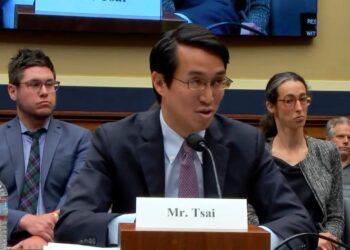
Samantha and Ariane Buck have struggled with medical debt for years, making it troublesome at instances to offer for his or her youngsters. A poll measure of their state of Arizona to cap rates of interest on medical debt handed overwhelmingly, fueled by help from Democrats and Republicans.
Ash Ponders for KFF Well being Information
cover caption
toggle caption
Ash Ponders for KFF Well being Information
Whereas hot-button well being care points resembling abortion and the Inexpensive Care Act roil the presidential race, Democrats and Republicans in statehouses across the nation have been quietly working collectively to deal with the nation’s medical debt disaster.
New legal guidelines to curb aggressive hospital billing, to increase charity look after lower-income sufferers, and to rein in debt collectors have been enacted in additional than 20 states since 2021.
Democrats championed most measures. However the legislative efforts usually handed with Republican help. In a number of states, GOP lawmakers led the push to increase affected person protections.
“No matter their occasion, no matter their background … any vital medical process can place individuals into chapter 11,” Florida Home Speaker Paul Renner, a conservative Republican, stated in an interview. “This can be a actual subject.”
Renner, who has shepherded controversial measures to curb abortion rights and increase the loss of life penalty in Florida, this 12 months additionally led an effort to restrict when hospitals may ship sufferers to collections. It garnered unanimous help within the Florida Legislature.
Bipartisan measures in different states have gone additional, barring unpaid medical payments from client credit score experiences and proscribing medical suppliers from inserting liens on sufferers’ houses.
About 100 million individuals within the U.S. are burdened by some type of well being care debt, forcing tens of millions to empty financial savings, take out second mortgages, or in the reduction of on meals and different necessities, KFF Well being Information has discovered. 1 / 4 of these with debt owed greater than $5,000 in 2022.
“Republicans within the legislature appear extra open to defending individuals from medical debt than from different kinds of debt,” stated Marceline White, govt director of Financial Motion Maryland, which helped lead efforts in that state to cease medical suppliers from garnishing the wages of low-income sufferers. That invoice drew unanimous help from Democrats and Republicans
“There appears to be broad settlement that you simply shouldn’t lose your own home or your life financial savings since you received in poor health,” White stated. “That’s only a primary degree of equity.”
Medical debt stays a extra polarizing subject in Washington, the place the Biden administration has pushed a number of efforts to deal with the problem, together with a proposed rule by the Client Monetary Safety Bureau, or CFPB, to bar all medical debt from client credit score experiences.
Vice President Harris, who’s spearheading the administration’s medical debt marketing campaign, has touted the work on the presidential marketing campaign path whereas calling for brand new efforts to retire well being care debt for tens of millions of Individuals.
Former President Donald Trump doesn’t usually discuss medical debt whereas stumping. However congressional Republicans have blasted the CFPB proposal, which Home Monetary Companies Committee Chairman Patrick McHenry (R-N.C.) referred to as “regulatory overreach.”
However, pollster Michael Perry, who has surveyed Individuals extensively about well being care, stated that conservative voters usually cautious of presidency appear to view medical debt by way of one other lens. “I believe they really feel it’s so stacked in opposition to them that they, as sufferers, don’t actually have a voice,” he stated. “The partisan divides we usually see simply aren’t there.”
When Arizona client advocates put a measure on the poll in 2022 to cap rates of interest on medical debt, 72% of voters backed the initiative.
Equally, nationwide polls have discovered greater than 80% of Republicans and Democrats again limits on medical debt collections and stronger necessities that hospitals present monetary assist to sufferers.

Dana Downey and Samuel Comacho participated in a roundtable on Capitol Hill in Washington, DC in 2023. The occasion hosted by Group Catalyst, a civil rights group, was pushing for a nationwide response to medical debt. Extra has occurred on the problem in states, nevertheless. (Photograph by Tasos Katopodis/Getty Pictures for Group Catalyst)
Tasos Katopodis/Getty Pictures
cover caption
toggle caption
Tasos Katopodis/Getty Pictures
Perry surfaced one thing else that could be driving bipartisan curiosity in medical debt: rising distrust as well being programs get larger and act extra like main firms. “Hospitals aren’t what they was,” he stated. “That’s making it clear that revenue and greed are driving plenty of the decision-making.”
Not each state effort to deal with medical debt has garnered broad bipartisan help.
When Colorado final 12 months turned the primary state to bar medical debt from residents’ credit score experiences, only one Republican lawmaker backed the measure. A Minnesota invoice that did the identical factor this 12 months handed with no single GOP vote.
However elsewhere, equally robust measures have sailed by way of.
A 2024 Illinois invoice to bar credit score reporting for medical debt handed unanimously within the state Senate and cleared the Home of Representatives 109-2. In Rhode Island, not a single GOP lawmaker opposed a credit score reporting ban.
And when the California Legislature took up a 2021 invoice to require hospitals within the state to offer extra monetary help to sufferers, it handed 72-0 within the state Meeting and 39-0 within the Senate.
Even some conservative states, resembling Oklahoma, have taken steps, albeit extra modest. A new legislation there bars medical suppliers from pursuing sufferers for money owed if the supplier has not publicly posted its costs. The measure, signed by the state’s Republican governor, handed unanimously.
New Mexico state Sen. Steve Neville, a Republican who backed laws to limit aggressive collections in opposition to low-income sufferers in that state, stated he was merely being pragmatic.
“There was not a lot benefit to spending a whole lot of time making an attempt to do collections on indigent sufferers,” Neville stated. “If they do not have the cash, they do not have the cash.” Three of 12 GOP senators supported the measure.
North Carolina state Treasurer Dale Folwell, a Republican who as a state legislator spearheaded a 2012 effort to ban same-sex marriage, stated all elected officers, irrespective of their occasion, ought to care about what medical debt is doing to sufferers.
“It doesn’t matter if, as a conservative, I’m saying this stuff, or if Bernie Sanders is saying this stuff,” Folwell stated, referencing Vermont’s liberal U.S. senator. “On the finish of the day, it ought to be all our jobs to advocate for the invisible.”
KFF Well being Information is a nationwide newsroom that produces in-depth journalism about well being points and is among the core working applications at KFF .












Discussion about this post